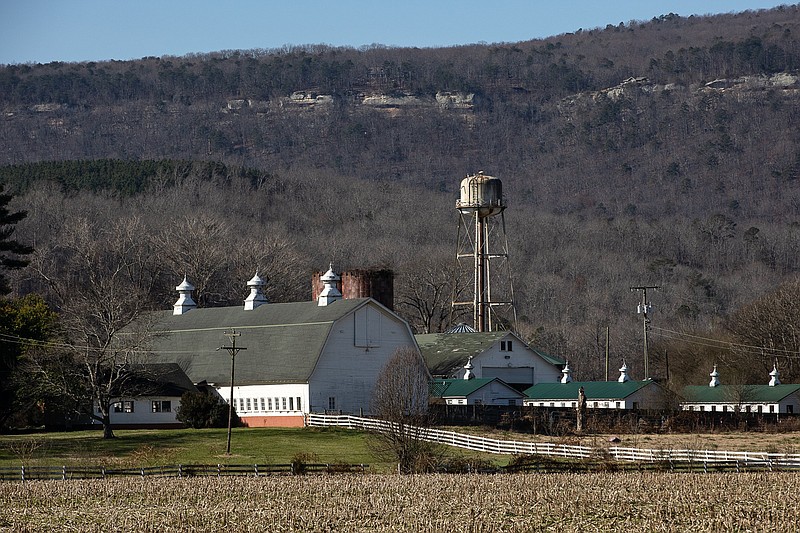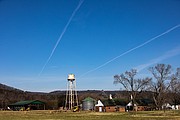Until late 2021, McDonald Farm in Sale Creek had been passed down through eight generations of the same family. Easter weekend, it debuts under new ownership with a Swing Into Spring celebration meant to introduce the sprawling property to its next successors - Hamilton County taxpayers.
Consider this a soft opening for the 2,170-acre site.
Except for a change in season, Swing Into Spring follows an established pattern of the most recent public use of the farm. Every fall from 2011 to 2019, 10 to 15 acres of the property were sectioned off for Old McDonald's Farm, giving visitors a chance to play in a corn maze, pick pumpkins and pet farm animals.
The same acreage will be open for the one-day festival, which will include a vintage baseball game, Easter egg hunt, inflatables and other family activities.
Eventually a portion of the property may become what County Mayor Jim Coppinger envisions as "one of the most talked about industrial parks in the state," as he described it in a February forum for area residents at Sale Creek Middle/High School.
For now, visions of economic development are hampered by infrastructure needs, including water, sewer and highway access. But the farm's initial ventures into agri-tainment are expected to help chart its course forward, said Tom Lamb, director of Hamilton County Parks and Recreation.
"We walked into this knowing we were going to preserve the house and barns and that that was going to be an opportunity to provide event space and programming to continue what had been done on the farm previously," he said.
Swing Into Spring gives the farm a chance to show off its potential.
FIRST STEPS
According to Lamb, the county has identified three components for what they hope to accomplish at McDonald Farm. An industrial park is part of that vision, he said, but it won't be a scene from "The Lorax," a Dr. Seuss book about environmental desecration.
"I think everybody assumed the short headline was that the county wants the farm for an industrial park and that they'd cut down all the trees and have chugging smokestacks everywhere," Lamb said.
When Coppinger announced in October that he would not seek re-election, the purchase of McDonald Farm was one of the projects he pledged to see through in his final months in office. The $16 million purchase was completed in December.
"Our intent from the very beginning was to not only build an industrial park on this site but to also use the property for mixed-use development as green space and even a learning environment for children, much like what we have done at Enterprise South where we have both industry and a nature park," Coppinger previously told the Times Free Press. "This property presents a lot of opportunities for different types of use."
Sewer lines will be extended to the property from the city of Dayton, and other improvements will be made over time to help provide needed land for industry and businesses looking to locate in the area, he said.
"We've got to be selective about who goes there and what it will do for the community," Coppinger told the crowd at the school forum, with a reminder that the economic development piece of the puzzle won't come quickly. "It takes years to put in infrastructure," he said.
With no industrial tenant "waiting in the wings" to move in, Lamb said, the recreation department is poised to lead the way initially.
The property's existing resources are plentiful in terms of historical significance and cultural resources, the other two components the county expects to showcase at the farm, he said.
"The first time I went out there and took a tour and looked at everything with the intent of knowing things the county can do there, it was a sensory overload," Lamb said. "I came back and just had a million ideas."
HISTORICAL SIGNIFICANCE
McDonald Farm not only figures into the history of Sale Creek but in the Chattanooga area at large.
James and Kitty McDonald first settled in the area at the foot of Walden's Ridge in 1821. That same year, the fifth president, James Monroe, was completing the first of two terms in the White House; Missouri was admitted as the 24th state; and Secretary of State John Quincy Adams negotiated the United States' purchase of the Florida territory from Spain.
The farm's main residence, a Greek Revival-style plantation house, was built by the McDonalds' fourth son, Benjamin Jones McDonald, in 1868, three years after the Civil War ended. According to an online history of the farm, Ben had a small house near his parents' original homestead, but his family of 11 outgrew it. It was this larger house that would become "the spiritual center of the McDonald Farm," as it's described on the farm's website.
During construction, the family reused "every possible piece of the old house," even straightening all the old nails so they could be used again. Two cottonwood trees were planted to provide shade - one of which is still standing behind the house. Ben had $100 to buy hardware, glass and other materials, but all the lumber was sawed from timber from the farm, according to the online history.
The residence was last renovated in the 1950s, according to a realty listing, and has been mostly off-limits to anyone but family over the last few years. Even their visits dwindled, said Amy Capehart, who worked for the McDonald family and was hired by the county as property manager when the farm was sold.
"Lots of people are curious about the main house, and I don't blame them," she said. "It's a great house."
Lamb said the residence and adjacent pool house eventually could be rented for corporate retreats, family reunions or other gatherings.
"We want to be able to preserve as much of it in the shape that it is," Lamb said of the residence. "We want to show how it may have looked in its heyday. We don't want to clean it up [modernize it] too much."
In addition to the 4,290-square-foot main house, the farm also holds two smaller residences, a pool house, a 4,440-square-foot barn built in 1940, two calf barns, a hay barn, stable and storage buildings.
The farm buildings figured prominently into the fall attractions offered by Old McDonald's Farm. But for many years, only an occasional wedding rental or church picnic brought any other activity to the grounds.
Yet the farm's influence has long reached beyond its borders.
Beginning in the 1920s and '30s, the working farm supplied milk, eggs and produce to the Home Stores grocery chain, which "Papa" Frank McDonald, one of Ben's sons, started in 1924 and passed down to his son, Roy Ketner McDonald. From the grocery chain, a newspaper would be born.
In 1933, in the middle of the Great Depression, Roy McDonald began printing advertising circulars for the Home Stores. Within three years, he had turned the weekly newsletter into a daily newspaper, the Chattanooga Free Press, that reached 65,000 homes. (It would become the News-Free Press in 1939 when McDonald bought the rival Chattanooga News.)
McDonald, who lived in Sale Creek until the mid-1970s, died in 1990 at his home in Lookout Mountain, Tennessee. The News-Free Press was sold in 1998 to WEHCO Media. The Arkansas-based company bought The Chattanooga Times the following year, merging the city's two newspapers.
RECREATION AND CONSERVATION
Old McDonald's Farm, organized by a former farm manager, introduced new generations of children to farm life, fall harvests and barnyard animals during the nine years it operated.
The attraction drew 25,000 visitors each season from Hamilton County and beyond, said Capehart. School field trips during the week brought in youngsters from schools in North Georgia, Whitwell and Harriman, Tennessee. Families visited on the weekends.
"I would love to see the field trips come back," Capehart said. "It's really something to see a child that's never got to pet a calf or a chicken or a goat. It is the best thing in the world to introduce them to something they've never done before. That was the most fun ever."
Lamb said the Hamilton County Fair will relocate to McDonald Farm the first weekend in October from Chester Frost Park, where parking was limited and tens of thousands of fairgoers had to be shuttled in from parking lots at Northgate Mall and Middle Valley Recreation Area.
Public input also has broached the possibility of horse riding and nature walks on the property, among other uses. In the school forum, some area residents expressed interest in keeping the fields available for farming.
"There are large portions of the property that have a tremendous amount of green spaces, for lack of a better term, that are not right for development," Lamb said. "There are a lot of places that don't really need to be changed from the condition they're in now."
SWING INTO SPRING
Visitors familiar with Old McDonald's Farm will find a similar setup for Swing Into Spring, to be held from 10 a.m. to 2 p.m. April 16, the Saturday before Easter.
Folks wondering what's coming next for the farm will be surrounded by its history. For the first time, walk-through tours of the main residence are expected to be available, and the two Chattanooga clubs in the Tennessee Association of Vintage Base Ball - Lightfoot and Mountain City - will play an exhibition game highlighting the customs of the sport's 1860s origins.
"We literally bring a backstop with chicken wire, three bases, a ball and bat, and we're ready to play," said Mountain City player John Hixson.
Lamb said be hopes the day will give visitors an idea of what the county envisions for the 10 to 15 acres already set up for recreational use.
"We'd like to be able to let people experience the property as we hope it will become," he said. "We want to give people an introductory experience."

